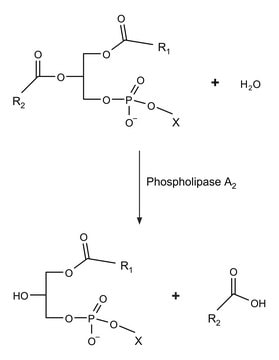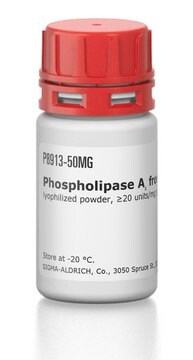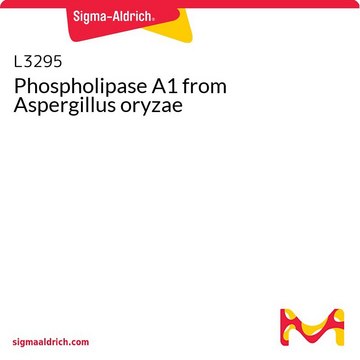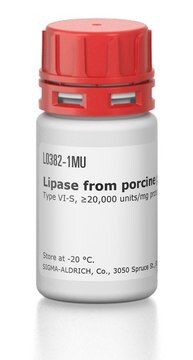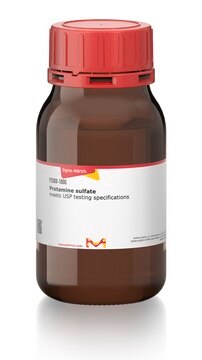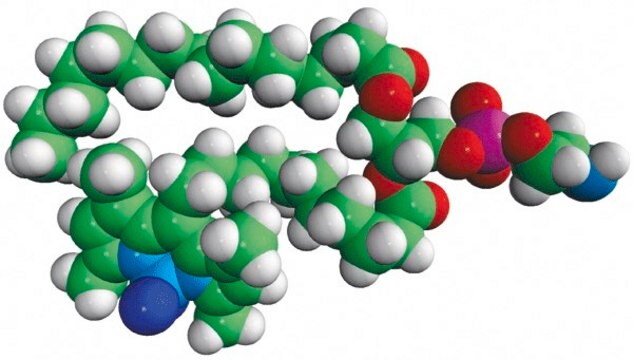P6534
Phospholipase A2 from porcine pancreas
ammonium sulfate suspension, ≥600 units/mg protein
Sinónimos:
Lecithinase A, PLA2, Phosphatidylcholine 2-acylhydrolase
Iniciar sesiónpara Ver la Fijación de precios por contrato y de la organización
About This Item
Productos recomendados
Formulario
ammonium sulfate suspension
actividad específica
≥600 units/mg protein
Nº de acceso UniProt
temp. de almacenamiento
2-8°C
Información sobre el gen
pig ... PLA2G1B(445525)
¿Está buscando productos similares? Visita Guía de comparación de productos
Descripción general
Phospholipase A2 is a small disulfide-rich protein having 124 residues. It is a calcium-dependent enzyme.
Aplicación
Phospholipase A2 has been used in phospholipase assay and to determine rat renal proximal tubular segments (PTS) viability during oxygenation and hypoxia-reoxygenation.
Acciones bioquímicas o fisiológicas
Hydrolyzes the β-ester bond of zwitterionic glycerophospholipids. Preferred substrates are phosphatidylcholine, phosphatidylethanolamine, and their plasmalogen analogues. Phosphatidylinositol and phosphatidylserine are also hydrolyzed. Aggressively attacks phospholipids in membranes of intact cells.
It has a high catalytic activity on aggregated substrates compared to monomeric substrates.
Definición de unidad
One unit will hydrolyze 1.0 μmole of soybean L-α-phosphatidylcholine to L-α-lysophosphatidylcholine and a fatty acid per min at pH 8.0 at 37 °C.
Forma física
Suspension in 3.2 M (NH4)2SO4 solution, pH 5.5
Nota de análisis
Protein determined by biuret.
Inhibidor
Referencia del producto
Descripción
Precios
Código de clase de almacenamiento
11 - Combustible Solids
Clase de riesgo para el agua (WGK)
WGK 1
Punto de inflamabilidad (°F)
Not applicable
Punto de inflamabilidad (°C)
Not applicable
Elija entre una de las versiones más recientes:
¿Ya tiene este producto?
Encuentre la documentación para los productos que ha comprado recientemente en la Biblioteca de documentos.
Los clientes también vieron
B van den Berg et al.
The EMBO journal, 14(17), 4123-4131 (1995-09-01)
The lipolytic enzyme phospholipase A2 (PLA2) is involved in the degradation of high-molecular weight phospholipid aggregates in vivo. The enzyme has very high catalytic activities on aggregated substrates compared with monomeric substrates, a phenomenon called interfacial activation. Crystal structures of
Knut Kölbel et al.
Biophysical chemistry, 206, 12-21 (2015-06-29)
Porcine pancreatic phospholipase A2, a small and disulfide rich protein, is extremely resistant against chemically or thermally induced unfolding. Despite this marked resistance, the protein displays broad unfolding transitions resulting in comparatively low apparent thermodynamic stability. Broad unfolding transitions may
R A Zager et al.
Proceedings of the National Academy of Sciences of the United States of America, 90(17), 8297-8301 (1993-09-01)
During hypoxic or ischemic renal tubular injury, phospholipase A2 (PLA2) induces membrane deacylation, causing fatty acid accumulation and phospholipid breakdown. Because these changes can compromise cellular integrity, PLA2 activity has been widely proposed as a critical mediator of hypoxic renal
Elena Venuti et al.
Journal of cystic fibrosis : official journal of the European Cystic Fibrosis Society, 16(6), 763-770 (2017-07-26)
Bile salt stimulated lipase (BSSL; Enzyme Commission (EC) number 3.1.1.13) has been a candidate triglyceridase for improving enzyme therapy for pancreatic insufficiency; however, its efficacy is near absent. We hypothesise that similarly to pancreatic lipase, BSSL is inhibited by phospholipids
B van den Berg et al.
Journal of biomolecular NMR, 5(2), 110-121 (1995-02-01)
The three-dimensional structure of porcine pancreatic PLA2 (PLA2), present in a 40 kDa ternary complex with micelles and a competitive inhibitor, has been determined using multidimensional heteronuclear NMR spectroscopy. The structure of the protein (124 residues) is based on 1854
Artículos
Instructions for working with enzymes supplied as ammonium sulfate suspensions
Nuestro equipo de científicos tiene experiencia en todas las áreas de investigación: Ciencias de la vida, Ciencia de los materiales, Síntesis química, Cromatografía, Analítica y muchas otras.
Póngase en contacto con el Servicio técnico